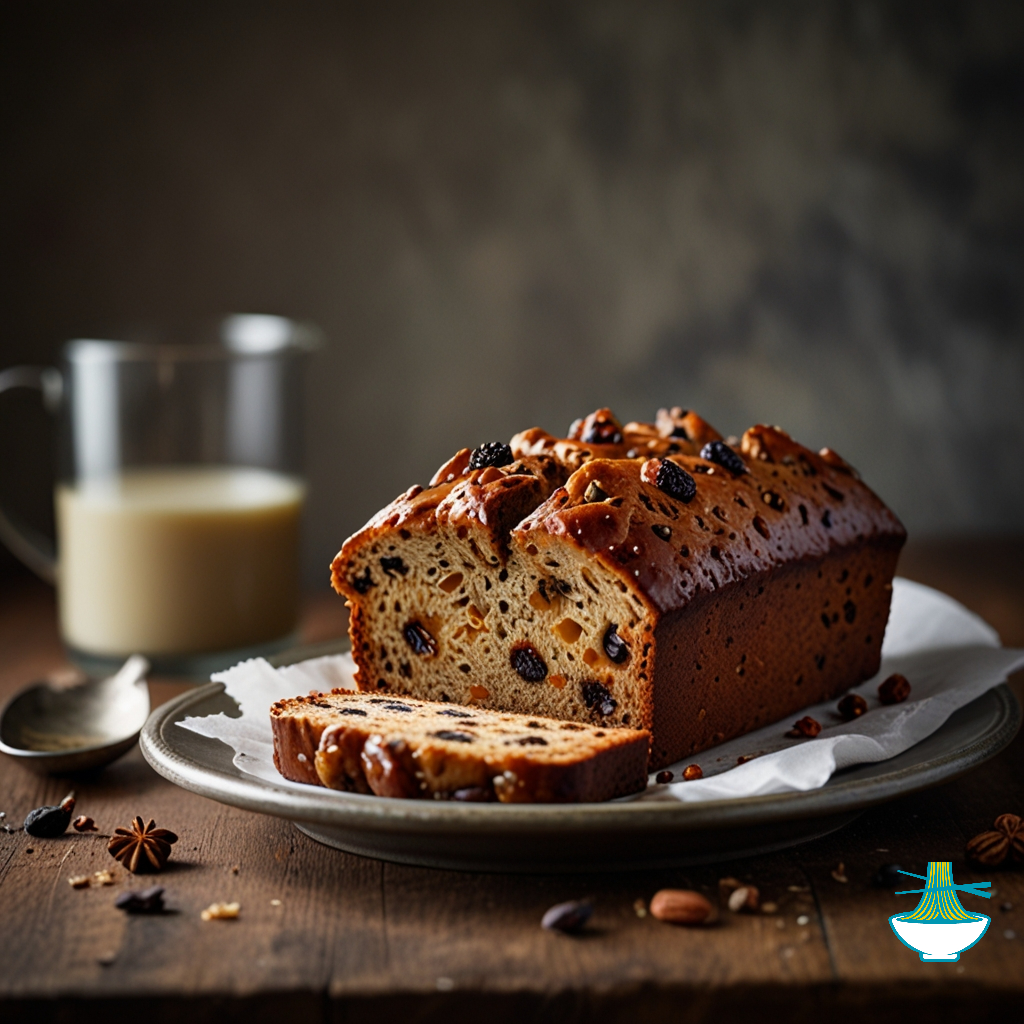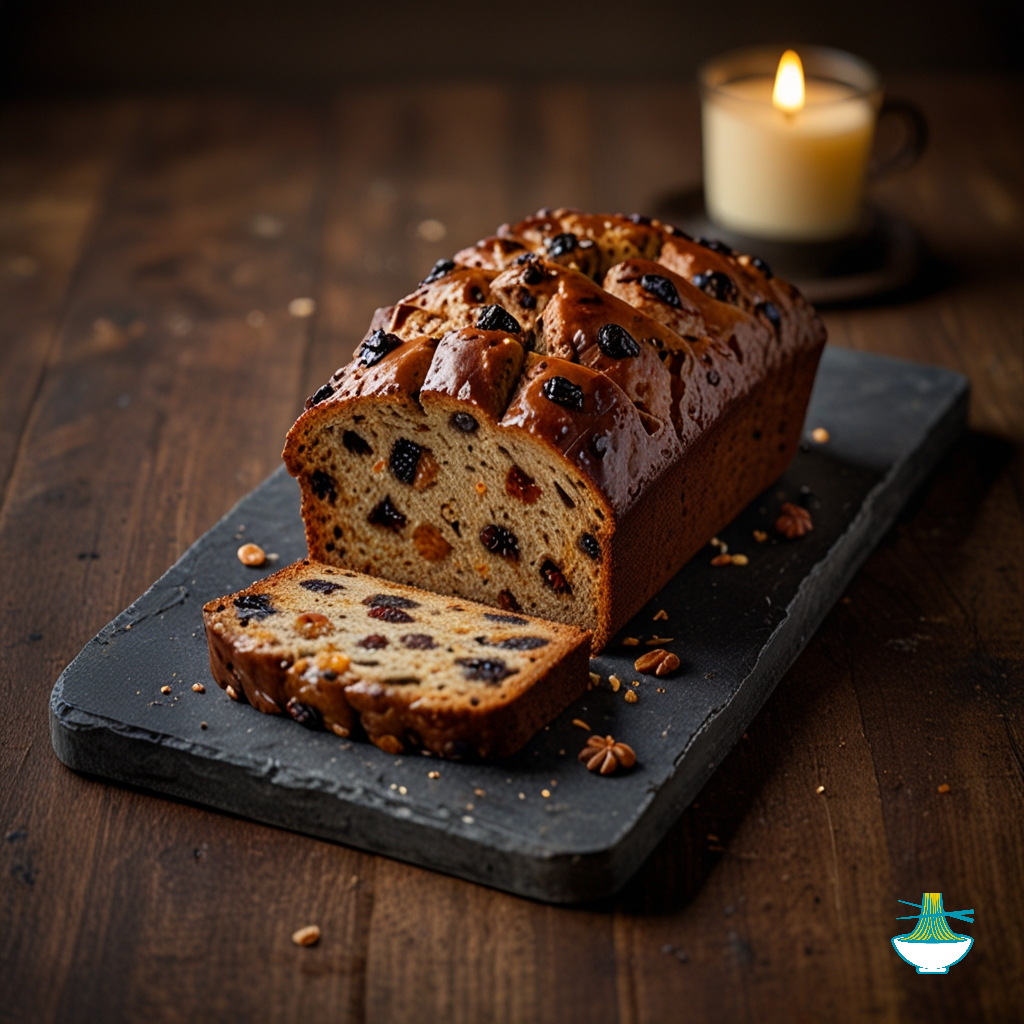Bara Brith, a traditional Welsh fruit loaf, is a beloved treat with a rich history. The recipe involves soaking dried fruits in hot tea overnight, which infuses them with flavor and moisture. Mixed with sugar, self-raising flour, egg, and spices, the mixture is baked to perfection, resulting in a deliciously moist and fragrant loaf.
Historically, Bara Brith has roots in Welsh baking traditions, where it was often made for special occasions or enjoyed as a tea-time delicacy. The name "Bara Brith" translates to "speckled bread," referring to the specks of dried fruits scattered throughout the loaf. This recipe has been passed down through generations, with variations in ingredients and techniques across different regions of Wales, but its popularity and charm remain timeless.
Ingredients:
- 250g mixed dried fruits
- 200ml hot black tea
- 150g brown sugar
- 250g self-raising flour
- 1 egg
- 1 tsp mixed spice
Method:
1. Place dried fruits in a bowl, pour hot tea over them, and let soak overnight.
2. Preheat oven to 180°C (350°F) and grease a loaf tin.
3. Add sugar, flour, egg, and mixed spice to the soaked fruits, mix well.
4. Pour the mixture into the prepared tin and bake for 1 hour until golden and firm.
5. Allow to cool before slicing and serving.
Nutrition Value:
1. 250g Mixed Dried Fruits:
- Calories: Approximately 600 kcal
- Carbohydrates: Around 160g
- Protein: Roughly 4g
- Fat: Minimal, typically less than 1g
- Sodium: Negligible, typically less than 5mg
- Cholesterol: None
- Vitamins: Rich in vitamin C and various B vitamins
- Minerals: Contains potassium, magnesium, and iron
- Nutritional Benefit: Provides natural sweetness, fiber, and a range of vitamins and minerals from different dried fruits like raisins, apricots, and currants.
2. 200ml Hot Black Tea:
- Calories: Virtually zero
- Carbohydrates: Negligible, typically less than 1g
- Protein: None
- Fat: None
- Sodium: Negligible, typically less than 5mg
- Cholesterol: None
- Vitamins: Contains antioxidants like catechins
- Minerals: Trace amounts of manganese and potassium
- Nutritional Benefit: Provides flavor and moisture to the dried fruits without adding significant calories or nutrients.
3. 150g Brown Sugar:
- Calories: Approximately 570 kcal
- Carbohydrates: About 150g
- Protein: None
- Fat: None
- Sodium: Minimal, typically less than 5mg
- Cholesterol: None
- Vitamins: No significant vitamins
- Minerals: Trace amounts of calcium and iron
- Nutritional Benefit: Adds sweetness and contributes to the texture of the loaf but is primarily a source of empty calories.
4. 250g Self-Raising Flour:
- Calories: Around 900 kcal
- Carbohydrates: About 200g
- Protein: Approximately 25g
- Fat: Minimal, typically less than 5g
- Sodium: Varies based on brand, typically less than 1000mg
- Cholesterol: None
- Vitamins: Contains small amounts of B vitamins
- Minerals: Contains iron and calcium
- Nutritional Benefit: Provides structure and volume to the loaf, along with some protein and essential minerals.
5. 1 Egg:
- Calories: Approximately 70 kcal per large egg
- Carbohydrates: Less than 1g
- Protein: Around 6g
- Fat: Approximately 5g, mostly from the yolk
- Sodium: About 70mg
- Cholesterol: About 185mg
- Vitamins: Rich in vitamin A, D, E, and B vitamins (especially B12)
- Minerals: Contains iron, phosphorus, and zinc
- Nutritional Benefit: Adds moisture, richness, and protein to the loaf, along with essential vitamins and minerals.
6. 1 tsp Mixed Spice:
- Calories: Negligible, typically less than 5 kcal
- Carbohydrates: Negligible, typically less than 1g
- Protein: None
- Fat: None
- Sodium: Minimal, typically less than 5mg
- Cholesterol: None
- Vitamins: Contains small amounts of vitamin C and B vitamins
- Minerals: Trace amounts of calcium and iron
- Nutritional Benefit: Contributes flavor and aroma to the loaf without significant nutritional impact.


Comments